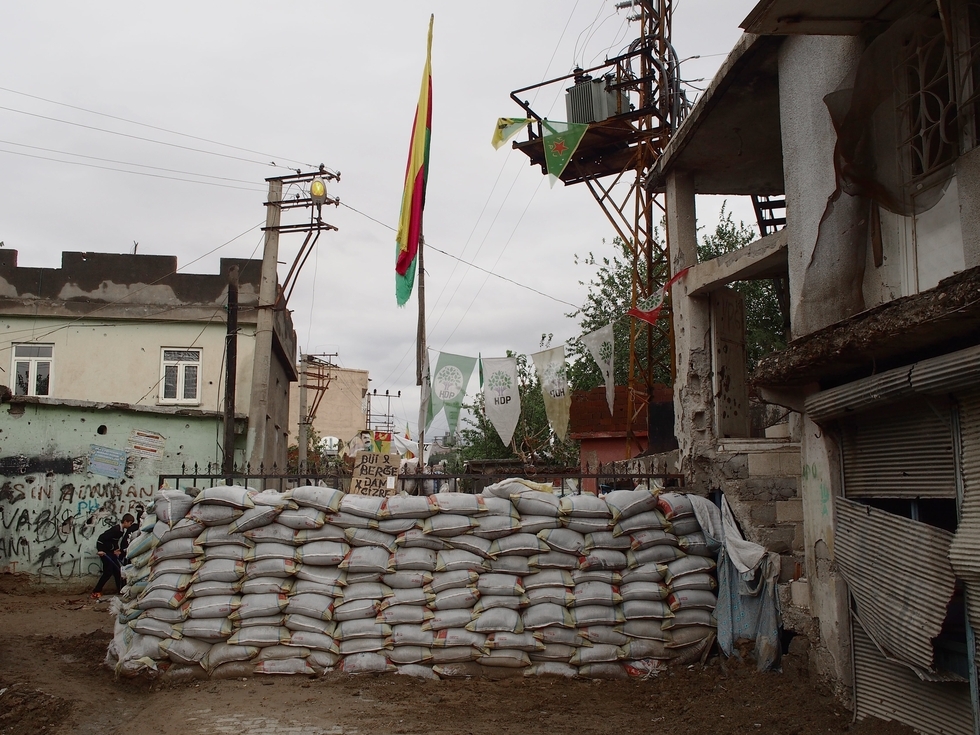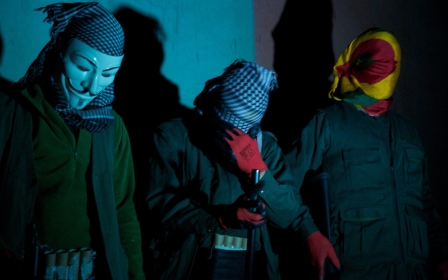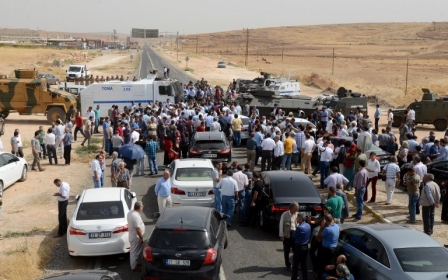Barricades and ballot boxes: Cizre's Kurds face polls with fear

CIZRE, Turkey - Night is falling in this town in southwestern Turkey facing the Kurdish-controlled territory of Rojava across the border in Syria.
Shops are closing minutes before the streets become empty. The city and its 120,000 mostly Kurdish inhabitants, who endured an eight-day siege in September as local Kurdish fighters battled government forces, voted for the pro-Kurdish People's Democratic Party (HDP) by an 84 percent majority in June's parliamentary elections.
Since the end of the siege, the young combatants of the "Patriotic Youth of Kurdistan” (YDG-H), which is considered the youth branch of the Kurdistan Workers' Party (PKK), have not laid down their arms.
The barricades have been further fortified, the trenches made deeper and nobody here believes the situation will be back to normal soon.
“I voted for HDP (People's Democratic Party) on 7 June and I will do it again next Sunday,” Mehmet, who has just turned 20, told Middle East Eye.
It is as if the confrontation could start again tomorrow. The population, barricaded inside their houses, seems resigned to wait for this new vote.
Many inhabitants see Turkish President Recep Tayyip Erdogan, who was Turkey's powerful prime minister from 2003 to 2014, as a dictator and blame him for recent Kurdish deaths at the hands of the security forces.
“Twenty-one people have been killed during the siege. All of this just because we did not vote for AKP (Erdogan's Justice and Development Party) during the last elections.”
Some discordant voices can be heard in this Kurdish stronghold, renowned as a recruiting hotspot for the PKK, which is considered a terrorist organisation by Turkey, the US and the EU.
“I am Kurdish, but the PKK is a terrorist organisation who killed several members of my family. Erdogan is a good president,” one person confided to MEE, speaking on condition of anonymity.
Violence and arrests
Turkey has been living for several months in a climate in which violence and political arrests have become commonplace.
Not a day goes by without new clashes between Kurdish separatists and the security forces, while journalists, both Turkish and foreign, have faced obstruction and arrest.
Last month, Frederike Geerdink, a Dutch journalist based in the southeastern Kurdish-majority city of Diyarbakir with a long track record of reporting on Kurdish issues, was accused of terrorism and expelled from the country.
But fear has soared to new heights since the bombing of a peace rally in Ankara on October 10 which killed 102 people and injured about 500 others.
While the attack was attributed to the Islamic State (IS) group, many people accused the Turkish government of complacency and even alleged complicity.
Prosecutors in Ankara said last week that one of the suicide bombers involved in the attack was the older brother of a suicide bomber who killed 31 people in an attack on a left-wing political meeting in Suruc in July.
But for one woman who, like many people spoken to, was not prepared to give her name, accusations of state complicity are unfounded.
“On October 26, two soldiers died during an operation launched against Daesh [an Arabic acronym for IS] in Diyarbakir. One of them was a 25-year-old man from my hometown. What complicity are they talking about?” she told MEE.
“The links between the HDP and the PKK is obvious. The conflict between Turkey and the PKK has never stopped, even during the pseudo-peace talks. Erdogan felt betrayed after the HDP's change of strategy even after the ceasefire. He's the one who signed the protocols in Oslo with the PKK. This is something the Turkish people will not forget.”
Leyla Imret, the 28-year-old mayor of Cizre who has been removed from office and accused of spreading terrorist propaganda and inciting violence by the Ministry of the Interior, tells a different story.
“The main difference between the HDP and the PKK is that the former is a political party aiming to participate in the electoral process at the national level. It's not only about the Kurds,” she told MEE.
“In Cizre, there is a strong support for the PKK, but the population wants the conflict to end. Nobody wants the situation of war from the 90s to start again. The HDP offers this perspective of peace.”
'Great political game'
Imret accused the government of using repressive measures to muzzle political opponents and the media in the run up to the election.
“The journalists from Vice News arrested in Diyarbakir had been accused of terrorist propaganda too. The accusations that were made against me are untrue. The fact that I was elected by the population should not be forgotten,” she said.
Among voters supporting the nationalist MHP meanwhile, there is distrust of Selahattin Demirtas, the leader of the HDP, and reproach for Erdogan over his once-feted peace overtures to Turkey's Kurdish minority which led to the PKK declaring a now broken ceasefire in 2013.
Erdogan's efforts had caused “so much trouble for the people”, one nationalist critic, who also did not want to give his name, told MEE.
“The words democracy and people are always in the mouth of Demirtas but for me a great political game is hiding behind all of this. I have no faith in his honesty whatsoever. The fact that he calls a dictator the only person [Erdogan] in the history of Turkey who dared launch peace talks with the Kurds proves it.”
Opinion polls suggest the results of Sunday's vote will be similar to those in June, with the AKP unable to form a majority in parliament, leaving many doubtful whether a coalition will emerge from the deadlock.
Mehmet Ali Sahin, the AKP's vice-president, has already stated that a third election will probably be called if the results are again indecisive.
Risks of electoral fraud and violence on the day of the vote are also on everyone's mind.
“It is possible that frauds and attacks will be organised, and that is why we are trying to take all possible precautions,” said Imret.
New MEE newsletter: Jerusalem Dispatch
Sign up to get the latest insights and analysis on Israel-Palestine, alongside Turkey Unpacked and other MEE newsletters
Middle East Eye delivers independent and unrivalled coverage and analysis of the Middle East, North Africa and beyond. To learn more about republishing this content and the associated fees, please fill out this form. More about MEE can be found here.




